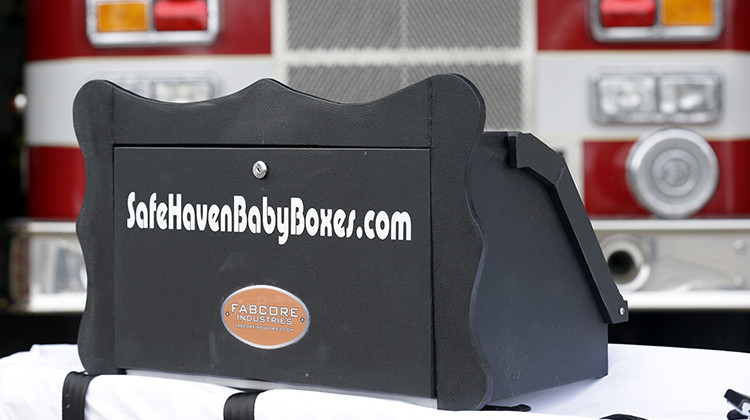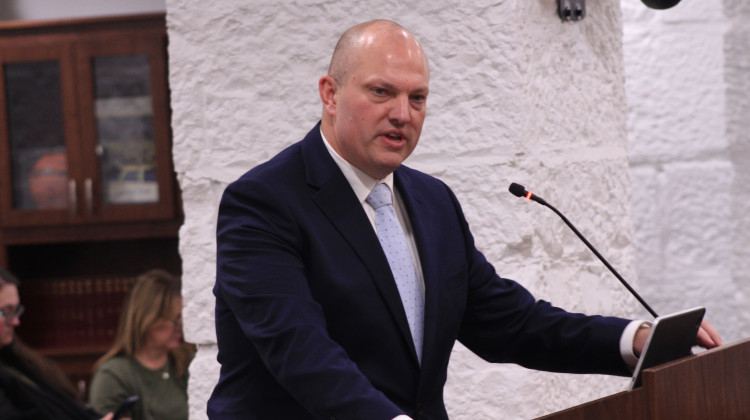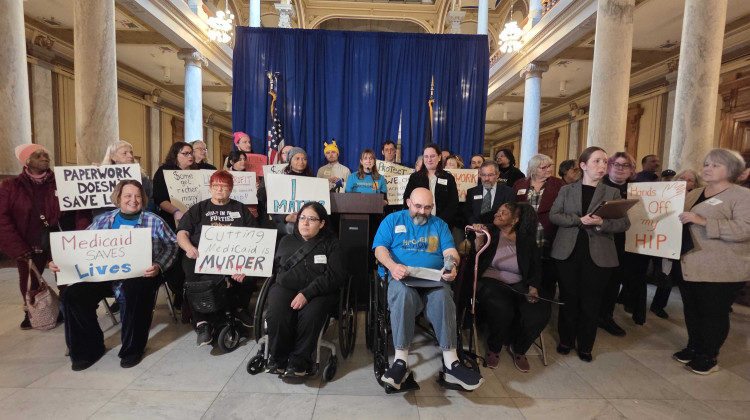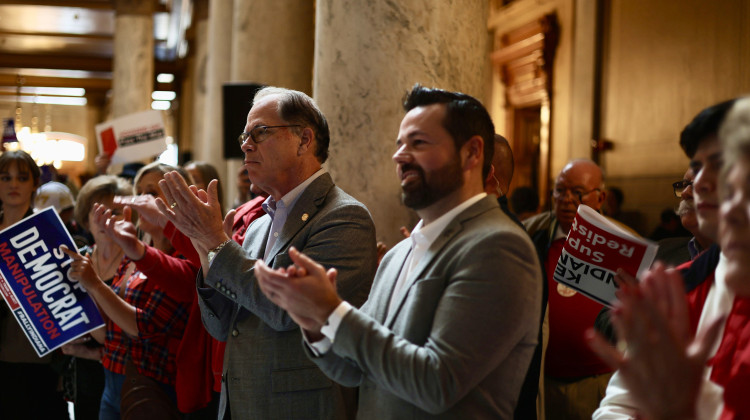
FILE - This Feb. 26, 2015 file photo shows a prototype of a baby box, where parents could surrender their newborns anonymously, outside the fire station in Woodburn, Indiana.
AP Photo/Michael Conroy, FileNIKI KELLY - The Journal Gazette
INDIANAPOLIS (AP) — “She was absolutely meant to be.”
That’s what Jennifer Melgoza says about her 7-month-old daughter Grace – a baby dropped off in a newborn incubator, also known as a baby box – last September.
“We were saving Grace, but she’s our saving grace,” Melgoza said.
The infant is one of six babies found in an incubator since the first installation in Woodburn in April 2016. Now there are 25 boxes around the state of Indiana and several more are in Ohio, Arkansas and Arizona.
The most recent baby was left in New Haven in February – a healthy newborn girl.
“Now in Indiana women are choosing to surrender safely,” said Monica Kelsey, the founder of Safe Haven Baby Boxes. She is a former firefighter and medic from Woodburn who was abandoned at birth herself.
“It’s there if a woman chooses it,” Kelsey said of the boxes. ’It’s better to have one and not need it than to need it and not have it.”
The incubators are containers with a door to the outside of a fire station building or a hospital. When opened, an alarm sounds to alert on-duty staff, nearby volunteers or emergency dispatchers. The boxes are climate-controlled, containing warming and cooling features, and lock after use.
The boxes have proliferated slowly – costs are about $10,000 to install – despite staunch opposition to them under then-Gov. Mike Pence. Jerome Adams, the current U.S. surgeon general, also opposed them when he was Indiana’s state health commissioner.
Adams and Mary Beth Bonaventura, the former director of the Indiana Department of Child Services, issued a joint statement in 2017 saying the boxes are “not a state-led or endorsed behavior” and that there is “simply no evidence to suggest the use of baby boxes is a safe, prudent way to surrender a child.”
But lawmakers kept pushing to legalize them as an option to Indiana’s Safe Haven law.
Under Indiana law a person can give up an infant anonymously without fear of arrest or prosecution. As long as there are no signs of intentional abuse, no information is required of the person leaving the baby.
But even under that law Indiana saw dozens of infants illegally abandoned – some found dead in restrooms, woods or dumpsters.
Kelsey notes there have been no dead abandoned newborns since 2015.
She said the baby boxes are just one part of a program that includes a national hotline. In all, her program has 72 saves. The majority involve a woman calling the hotline and a counselor meeting the woman who agrees to hand the child over.
Sen. Travis Holdman, R-Markle, pushed the bill and said it’s going well. He acknowledged the cost is somewhat prohibitive but that private donors have stepped forward.
In one case, a teenager raised the money by mowing lawns and installed one for a senior project.
Holdman said he is glad DCS stopped opposing the boxes under Gov. Eric Holcomb.
“It was actually embarrassing that they would fight against that. They wanted the ability to go after the father if there was child molesting and sexual abuse,” Holdman said. “We had to look to the greater good, which was the argument that won the day.”
Kelsey acknowledged that she brought a program to the U.S. and launched it in Indiana when there were a lot of unknowns and questions.
“I do believe that (the Department of Child Services) has seen the success of the baby box and it starting to maybe warm up,” she said.
DCS spokeswoman Noelle Russell said the agency is unaffiliated with the program and complies with the Safe Haven law provided by statute.
A department report shows 51 newborns have been surrendered under the law since July 2008. But the report doesn’t differentiate between baby box drop-offs and other Safe Haven surrenders.
Department of Child Services places all of the children – that is how Grace came to be with Jennifer and Mario Melgoza.
The couple were unable to have children and decided to adopt an older child. They went through the process for five or six different children but weren’t chosen by the agency.
“I really felt like maybe it wasn’t meant to be,” Jennifer said.
Then in September 2019 she learned from news reports that a baby had been placed in the baby box in their Hammond neighborhood.
They submitted a home study to adopt her. A few weeks went by, and the couple stopped talking about it and assumed DCS had chosen another family.
Jennifer was at work when she got a call from Department of Child Services to do an interview for the baby girl.
Within a few days of that interview Grace came home with them.
“She is the happiest most playful thing ever. She is always smiling and talks so much,” Jennifer said.
And Grace loves to be around her cousins – one just turned 1 and another is going to be 2.
“During quarantine we FaceTime, and they just scream at each other,” Jennifer said.
The Melgozas are open to meeting Grace’s biological mom one day – if she is ready.
“I would love to meet her just to tell her thank you,” she said.
Kelsey said one mother who used a baby box last year left a two-page letter with the newborn explaining her actions.
“I didn’t want to have to justify my reasoning to anyone,” the mother wrote.
 DONATE
DONATE






 Support WFYI. We can't do it without you.
Support WFYI. We can't do it without you.